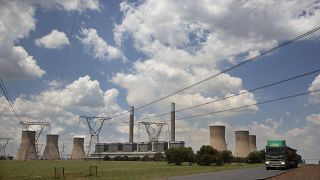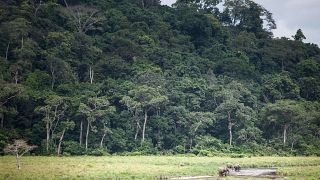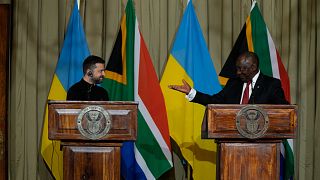South Africa
The industrial landscape of the northeastern province of Mpumalanga, an area known as South Africa's coal belt will soon be transformed.
The Komati power plant, once a busy coal plant that is now earmarked to be repurposed as a wind and solar power plant that will have batteries to store the energy the clean power generates, looks deserted with only security guards and cleaners on site.
Unlike other power stations in Mpumalanga where smoke bellows from the unit chimneys with coal trucks entering and leaving the plants, only one entrance at the Komati plant, which was first opened for business in 1961, is functional.
The country's worst blackouts have put the spotlight on the government's controversial energy transition strategy.
“These arguments about decommissioning power plants have come up, and while climate change is a significant issue and we do need to transition to lower carbon sources of electricity, we need to consider the need for an increase in electricity in general in South Africa," Julia Taylor, a researcher on Climate Change and Inequality at the University of the Witwatersrand said.
"So we need to continue to build out renewable energy but not start switching anything off until we have enough electricity to provide for basic needs in the country.”
The Komati plant's repurposing is a pilot project that will hopefully show the way for South Africa and the rest of the developing world’s transition to clean energy away from dirty fossil fuels.
The World Bank has provided a loan of $490 million for the plant’s repurposing.
The money is supposed to include the retraining of former plant employees, but it was unclear this week how much of this part of the project had already started.
The work related to repurposing the plant is yet to gather steam, with estimations that this may take up to five years.
In November last year, the last generation unit at the coal-fired power station which was generating about 125 megawatts of power was shut down.
Controversial funding model
This week, the power utility Eskom invited bids for the implementation of a socio-economic plan to mitigate the effects of the plant’s closure, including the economic impact on the province of Mpumalanga and surrounding communities where the plant is located.
When developing countries are asked to prioritize green projects out of environmental concerns, various deals are proposed. The Just Energy Transition Partnership (JetP) financing model has raised questions.
While $490 million is a large sum by any measure, a Researcher highlights that a large portion of this money is in the form of loans.
“There are a few questions that have been raised around the funding model associated with the JetP", she says.
"And the first is, particularly from South African perspective, is that only 4% of the current amount that's promised is grants. So it's actually mostly loans and guarantees. And obviously, we're a country in a significant amount of debt.”
South Africa's president is attending a summit on climate and debt in Paris. Top on the agenda are changes needed in the way multilateral lenders grant money to developing countries which are often hardest hit by the climate crisis. The bodies have been criticized for not factoring this crisis in their decisions.
Lives soon turned upside down?
The closest residential area near the Komati power plant is a small suburb, also called Komati, and most people here work at coal mines around the province.
The houses in there are well-built and old fashioned.
They used to be owned by the power utility Eskom during the apartheid era and were provided for white managers of the power plant. They were sold off to individuals after 1994, mostly high-earning workers at coal mines around the province.
The locals say most of the houses are now being rented out to contractors for the coal mines and trucking companies in the region. Groups of men were waiting around Komati, hoping to be picked up by contractors in trucks who provide them temporary jobs as gardeners or cleaners in nearby settlements.
There is only one primary school and one shopping mall in Komati and everyone here depends on coal jobs to make ends meet.











Go to video
South Africa's tax row heads to court as implementation date nears
Go to video
South Africa appoints Mcebisi Jonas as special US envoy in bid to ease tensions
Go to video
South Africa: inquest into death of Nobel Peace Prize laureate Chief Albert Luthuli re-opened
Go to video
10.3 Million tons of food wasted in South Africa as chefs push for sustainability
Go to video
South Africans protest gender violence after child rape allegation
Go to video
Rare blue diamond goes on display in Abu Dhabi ahead of May auction